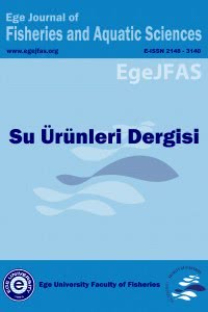Organik balık üretimi' nin mevcut durumu
balık, doğal gıdalar, balık yetiştiriciliği, gıda güvenliği, organik gıdalar
Current status of organic fish production
fishes, natural foods, fish farming, food security, organic foods,
___
Bergleiter, S. 2001. Organic products as high quality niche products: background and prospects for organic freshwater aquaculture in Europe. Paper presented at the ad hoc EIFAC/EU Working Party on Market Perspectives for European Freshwater Aquaculture, Brussels (Belgium), 12-14 May 2001.Brister, D.J. and A. Kapuscinski. 2001. Global rise of aquaculture: A trigger for organic and eco-labelling standards for aquatic animals. The Organic Standard 3:7-11.
Lem, A. 2004. An overview of the present market and trade situation in the aquaculture sector and the current and potential role of organic products. Organic aquaculture and sea farming 15 -17 June 2004.
Naturland. 2005. Aquaculture (www.naturland.de/englisch/n4/seite4_5.html).
Soil Association. 2001. Fish farming and organic standards. (www.soilassociation.org/sa/saweb.nsf/librarytitles/AnimaLWelfare11022 000).
Tacon, A.G.J. and D.J. Brister. 2002. Organic aquaculture: Current status and future prospects. In N. E., Scialabba and C. Hatam (eds). Organic agriculture, environment and food security Environment and Natural Resources Series No. 4 Rome, 2002,258 pp.
Tekinay, A.A., Güroy, D., Güroy, B.K., Çevik, N., 2005. Applicability of organic aquaculture in Turkey. I. International Food and Nutrition Congress.
UKROFS, 2001. United Kingdom Register of Organic Food Standards for Organic Food Production. United Kingdom Register of Organic Food Standards (www.defra.gov.uk/farm/organic/ukrofs/standard.pdf)
USDA, 2000. United States Department of Agriculture's National Organic Programme Final rule on national standards for organic crop and livestock production and handling. (www.ams.usda.gov/nop/nop2000/nop2/finalrulepages/finalrulemap.
- ISSN: 1300-1590
- Yayın Aralığı: 4
- Başlangıç: 1984
- Yayıncı: Aynur Lök
Effects of dietary enzyme supplement on growth of gilthead sea bream (Sparus aurata L., 1758)
MAHMUT ELP, FAZIL ŞEN, OSMAN ÇETİNKAYA
Taşucu Körfezi (Doğu Akdeniz) karides trollerinde hedef dışı av
OZAN SOYKAN, H.Tuncay KINACIGİL, ZAFER TOSUNOĞLU
Ahtopot (Octopus vulgaris Cuvier, 1797) yetiştiriciliği
MELTEM MANAŞIRLI, DURSUN AVŞAR, HACER YELDAN, ERDOĞAN ÇİÇEK, CANER ENVER ÖZYURT
İzmir Körfezinde avlanan bazı balık türlerinin kimyasal değişimleri üzerine bir araştırma
M. Ayçe GENÇ, FUNDA TURAN, Ihsan AKYURT, CEMİL KAYA GÖKÇEK, AYDIN DEMİRCİ, Mevlüt GÜRLEK
Çapalı Gölü (Afyon) makrobentik omurgasızlarının taban yapısı ve su kalitesine bağlı olarak dağılımı
Ö. Osman ERTAN, İSKENDER GÜLLE, M. Zeki YILDIRIM
Orta Karadeniz Bölgesi Balıkçılığı ve balıkçıların sosyo-ekonomik durumu
